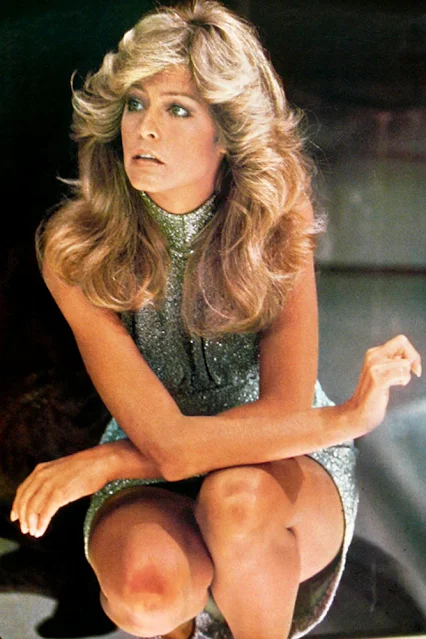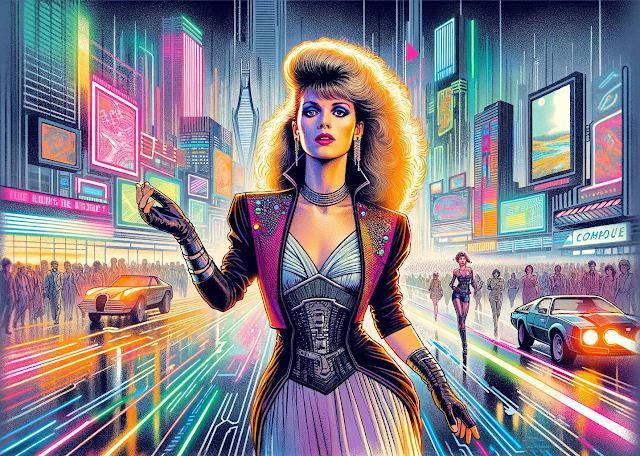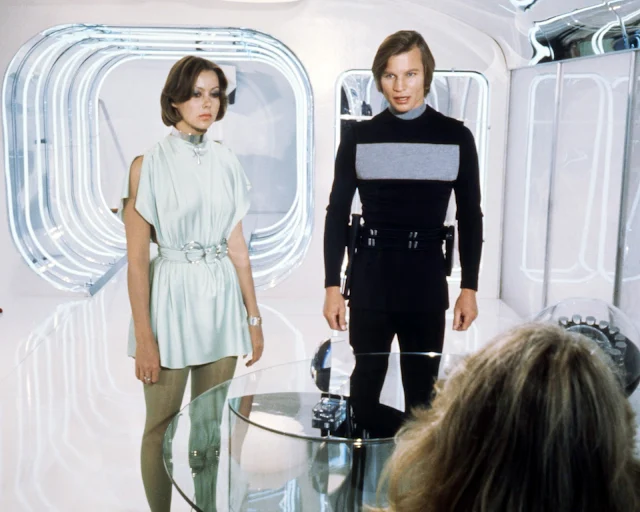Set against a backdrop of advanced technology and societal structure designed to sustain this facade of perfection, "Logan's Run" delves into the profound implications of such control on human identity, freedom, and the very fabric of societal ethics.
The core of "Logan's Run" lies a complex exploration of themes that resonate with fundamental human concerns:
The core of "Logan's Run" lies a complex exploration of themes that resonate with fundamental human concerns:
- the draconian measures of societal control
- the inherent human quest for truth
- the struggle between the sanctity of individual life and the collective good.
Through the journey of its protagonist, the narrative unfolds the layers of ageism, the illusion of a utopian existence, and the enduring value of freedom and truth. This essay aims to dissect these themes, offering a comprehensive analysis that highlights the narrative's rich commentary on the eternal conflict between individual freedom and societal dictates.
Through this examination, "Logan's Run" emerges not only as a critique of extreme solutions to societal problems but also as a reflection on the timeless human condition and the perpetual search for meaning beyond the confines of imposed boundaries.
When discussing "Logan's Run," it's essential to acknowledge the creative talents behind its cinematic adaptation. Directed by Michael Anderson, known for his work on epics like "Around the World in 80 Days," Anderson's vision for "Logan's Run" encapsulates a futuristic society with a blend of intrigue and sophistication, while also delving into the thematic complexities of freedom and societal control. The screenplay, crafted by David Zelag Goodman, is based on the novel by William F. Nolan and George Clayton Johnson, effectively translating the story's dystopian themes and existential queries into a visual and narrative format that resonates with audiences.
The film's lead, Michael York, embodies Logan with a nuanced performance that captures the character's transformation from a complacent enforcer of the societal order to a determined seeker of truth and freedom. Alongside York, Jenny Agutter portrays Jessica, Logan's companion and catalyst for change, bringing depth and emotional resonance to the role. Their on-screen chemistry not only drives the narrative forward but also underscores the film's exploration of human connections in a controlled society.
Through this examination, "Logan's Run" emerges not only as a critique of extreme solutions to societal problems but also as a reflection on the timeless human condition and the perpetual search for meaning beyond the confines of imposed boundaries.
When discussing "Logan's Run," it's essential to acknowledge the creative talents behind its cinematic adaptation. Directed by Michael Anderson, known for his work on epics like "Around the World in 80 Days," Anderson's vision for "Logan's Run" encapsulates a futuristic society with a blend of intrigue and sophistication, while also delving into the thematic complexities of freedom and societal control. The screenplay, crafted by David Zelag Goodman, is based on the novel by William F. Nolan and George Clayton Johnson, effectively translating the story's dystopian themes and existential queries into a visual and narrative format that resonates with audiences.
The film's lead, Michael York, embodies Logan with a nuanced performance that captures the character's transformation from a complacent enforcer of the societal order to a determined seeker of truth and freedom. Alongside York, Jenny Agutter portrays Jessica, Logan's companion and catalyst for change, bringing depth and emotional resonance to the role. Their on-screen chemistry not only drives the narrative forward but also underscores the film's exploration of human connections in a controlled society.
Ageism and Societal Control in "Logan's Run"
"Logan's Run" presents a society where ageism is institutionalized through the imposition of a maximum age limit, embodying a stark critique of age-based discrimination.In this dystopian future, the concept of ageism transcends mere prejudice or discrimination; it is an axiom of societal survival, a draconian measure enforced to maintain resource balance and societal harmony.
This systematically embedded ageism, marked by the termination of life at the age of 30, serves as a chilling reflection on the value assigned to youth and the marginalization of those deemed too old to contribute to society's superficial utopia.
The societal control mechanisms in "Logan's Run" are both overt and insidious. The lifecycle, visually represented by the color-changing crystal in each citizen's palm, acts as a constant reminder of the individual's mortality and the state's omnipresent surveillance.
The societal control mechanisms in "Logan's Run" are both overt and insidious. The lifecycle, visually represented by the color-changing crystal in each citizen's palm, acts as a constant reminder of the individual's mortality and the state's omnipresent surveillance.
This bio-engineered crystal not only signifies the nearing of one's "Lastday" but also symbolizes the extent of societal control, where even the most personal aspect of existence—time—is governed by the state.
The ritual of "Carousel" is another tool of control, masquerading as a celebration of renewal, where those reaching the age of 30 are ostensibly reborn, though in reality, they are systematically eliminated. This spectacle serves both as entertainment and indoctrination, reinforcing the societal norm that to die at 30 is a glorious fate.
The ageist policies of "Logan's Run" profoundly impact individual identity and development. By capping life at 30, the society not only curtails personal growth and wisdom that come with age but also fosters a culture of superficiality and compliance. Individuals are dissuaded from contemplating the deeper meanings of existence, discouraged from questioning the status quo, and deterred from pursuing long-term personal or societal goals.
The ageist policies of "Logan's Run" profoundly impact individual identity and development. By capping life at 30, the society not only curtails personal growth and wisdom that come with age but also fosters a culture of superficiality and compliance. Individuals are dissuaded from contemplating the deeper meanings of existence, discouraged from questioning the status quo, and deterred from pursuing long-term personal or societal goals.
This enforced superficial existence is juxtaposed with the protagonist's journey, which symbolizes the quest for a deeper understanding of self and society beyond the confines of ageist dictates. As Logan and Jessica navigate the perils beyond their societal boundaries, they uncover not just the falsehoods of their world but also the potential for individual growth and wisdom unrestricted by age.
Utopia vs. Dystopia in "Logan's Run"
"Logan's Run" masterfully crafts a society that, on the surface, appears as a utopia. Technological advancements ensure the fulfillment of every citizen's needs and desires, creating an existence devoid of want, labor, or apparent conflict.This veneer of perfection is maintained through the rigid control of population and the systematic elimination of anyone reaching the age of 30, purportedly to sustain harmony and resources.
The societal construct presents a life of leisure and pleasure, where every whim, sexual or other is catered to, but at a price that is cleverly obscured from its inhabitants. This dichotomy raises critical questions about the nature of utopia and the sacrifices deemed acceptable for its realization.
Beneath the utopian facade lies a dystopian reality, marked by the denial of fundamental human experiences such as aging, the development of deep relationships, and the pursuit of personal growth beyond prescribed boundaries. The society's method of maintaining its utopia—through the Carousel ritual and the absolute control over life and death—reveals a profound dystopia rooted in deception and control. The absence of choice and the suppression of dissent highlight the dystopian nature of a world where the cost of perfection is the loss of freedom and individuality. This realization becomes a turning point for the protagonist, Logan, whose journey of discovery exposes the dystopian undercurrents of his world, challenging the audience to reconsider the true meaning of utopia.
The concept of "Sanctuary" serves as a pivotal element in the narrative, representing the hope for an alternative to the dystopian reality masked as utopia.
Beneath the utopian facade lies a dystopian reality, marked by the denial of fundamental human experiences such as aging, the development of deep relationships, and the pursuit of personal growth beyond prescribed boundaries. The society's method of maintaining its utopia—through the Carousel ritual and the absolute control over life and death—reveals a profound dystopia rooted in deception and control. The absence of choice and the suppression of dissent highlight the dystopian nature of a world where the cost of perfection is the loss of freedom and individuality. This realization becomes a turning point for the protagonist, Logan, whose journey of discovery exposes the dystopian undercurrents of his world, challenging the audience to reconsider the true meaning of utopia.
The concept of "Sanctuary" serves as a pivotal element in the narrative, representing the hope for an alternative to the dystopian reality masked as utopia.
Logan's search for Sanctuary, driven by his initial mission to uncover and destroy it, evolves into a personal quest for truth, freedom, and a life unbound by the arbitrary restrictions of his society.
Sanctuary symbolizes the possibility of a community where individuals can live freely, age naturally, and explore the depths of human experience without fear of retribution. This quest challenges the notion of utopia presented by Logan's society, suggesting that true utopia might lie in the freedom to live authentically, embracing the complexities and imperfections of life.
 |
| Farrah Fawcett |
The Quest for Truth in "Logan's Run"
"Logan's Run" embarks on a compelling exploration of the quest for truth, driven by the protagonist's transformation from an unquestioning enforcer of the societal norms to a determined seeker of truth. Logan's journey begins within the confines of a society that meticulously controls information and history to maintain its utopian facade.The initial acceptance of his role as a Sandman, tasked with eliminating those who resist society's ageist laws, reflects a broader acceptance of the status quo. However, as the narrative unfolds, Logan's encounter with the concept of Sanctuary—a rumored haven for those seeking to escape the city's oppressive control—ignites a profound shift in his perspective. This transition from compliance to questioning represents a crucial theme in the narrative: the power of truth to challenge and dismantle deeply entrenched societal norms.
The control of knowledge emerges as a pivotal tool for maintaining societal control in "Logan's Run." The citizens' lack of access to historical context, the true nature of the outside world, and the reality behind the Carousel ceremony underscores the regime's manipulation of truth to sustain its authority.
The control of knowledge emerges as a pivotal tool for maintaining societal control in "Logan's Run." The citizens' lack of access to historical context, the true nature of the outside world, and the reality behind the Carousel ceremony underscores the regime's manipulation of truth to sustain its authority.
Logan's quest for Sanctuary thus becomes not only a physical journey but also an epistemological one, as he seeks to uncover the truths hidden by his society. This pursuit of knowledge serves as a metaphor for the awakening of consciousness, illustrating how access to truth can empower individuals to challenge and redefine the boundaries imposed by authoritarian systems.
 |
| Concept design of Holly 13 |
Individual Freedom vs. Societal Control in "Logan's Run"
In the heart of "Logan's Run" lies a poignant exploration of the tension between individual freedom and societal control. The society depicted in the narrative is one that prioritizes the collective good at the expense of personal liberties, showcasing a dystopian reality where individual desires and freedoms are subordinated to the perceived needs of the society.The rigid age limit, enforced through the lifecycle and the Carousel ritual, epitomizes this control, stripping individuals of their right to live beyond a predetermined age.
However, the protagonist's journey from a loyal enforcer of this system to a rebel in search of truth and autonomy underscores the intrinsic value of individualism. It highlights the human spirit's resilience and the fundamental need for freedom, choice, and the pursuit of one's destiny.
"Logan's Run" delves into the ethical quandaries surrounding societal sacrifice, questioning the morality of sacrificing individual freedoms for the sake of a harmonious or sustainable society. The narrative posits a society that has chosen to eliminate any form of dissent or deviation from the norm, ostensibly to maintain order and harmony. This societal model raises profound ethical questions about the limits of control and the sacrifices deemed acceptable in the quest for a utopian existence.
The concept of a utopian society in "Logan's Run" is critically examined through the lens of the price paid for such an existence. The enforced age limit, the illusion of renewal, and the suppression of knowledge all contribute to the maintenance of this utopia. However, the protagonist's journey exposes the dystopian underbelly of this supposed paradise, revealing the high cost of utopia: the loss of personal autonomy, the denial of natural human experiences, and the ethical compromises required to sustain the societal facade.
Through its depiction of a society that has seemingly achieved utopian harmony at the cost of personal freedoms and individual identity, "Logan's Run" invites audiences to engage in a critical examination of the values and principles that underpin our own societal constructs.
"Logan's Run" delves into the ethical quandaries surrounding societal sacrifice, questioning the morality of sacrificing individual freedoms for the sake of a harmonious or sustainable society. The narrative posits a society that has chosen to eliminate any form of dissent or deviation from the norm, ostensibly to maintain order and harmony. This societal model raises profound ethical questions about the limits of control and the sacrifices deemed acceptable in the quest for a utopian existence.
The concept of a utopian society in "Logan's Run" is critically examined through the lens of the price paid for such an existence. The enforced age limit, the illusion of renewal, and the suppression of knowledge all contribute to the maintenance of this utopia. However, the protagonist's journey exposes the dystopian underbelly of this supposed paradise, revealing the high cost of utopia: the loss of personal autonomy, the denial of natural human experiences, and the ethical compromises required to sustain the societal facade.
Through its depiction of a society that has seemingly achieved utopian harmony at the cost of personal freedoms and individual identity, "Logan's Run" invites audiences to engage in a critical examination of the values and principles that underpin our own societal constructs.
-
The thematic exploration of ageism and societal control in "Logan's Run" raises significant questions about the valuation of life and the ethical implications of imposing limitations on existence for the greater good. The narrative challenges the audience to consider the moral costs of maintaining societal harmony and the inherent value of life at every stage.
The juxtaposition of utopia and dystopia within the film serves as a compelling critique of the pursuit of an ideal society at the expense of individual freedoms and the complexity of human nature. "Logan's Run" suggests that true utopia might not be found in the absence of conflict, aging, or death, but rather in the embrace of freedom, the richness of life's experiences, and the acceptance of the inevitable imperfections of existence.


















